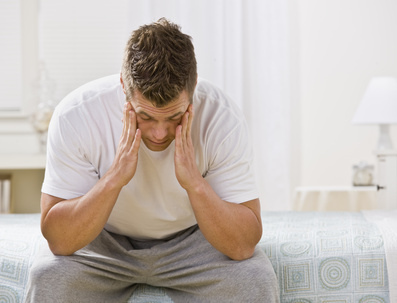Male Depression – How Is It Different?

By: Mic445
by Andrea M. Darcy
The misconception still persists that depression is something that more women suffer than men. Or that depression makes you weak and ‘unmanly’.
And yet many famous and successful men suffered from what Churchill called the “black dog” when he dealt with it. Ernest Hemingway tried to drink his depression away. And Abraham Lincoln suffered so deeply, his friends formed a suicide watch.
Recent male celebrities to admit to depression include Stephen Fry, Jim Carrey, Robbie Williams, and Owen Wilson.
Are males sometimes more depressed than females?
Depression is actually no more common in girls than boys until puberty sets in. True, from then until late middle age, the disorder is more commonly diagnosed in women. But around aged fifty, the numbers even out.
The English Longitudinal Study on Ageing (ELSA) has reported older women often have a higher degree of satisfaction and happiness than men do, suggesting that men may be more prone to depression than women as they age.
And when it comes to suicide, rates are much higher in men than women. In 2014, the Office for National Statistics reported incidences of suicide as three times higher among males than among females.
(For more on gender and mental health, read our article, ‘What Gender is More Prone to Depression?)
Why do more men go undiagnosed for depression?
Why would these statistics not be commonly known? Males are often diagnosed with other conditions where depression is seen as only a symptom, and does not remain the focussed on symptom at that. For example, in children, more boys are diagnosed with ADHD then girls. And the label of ADHD puts the focus more often on hyperactivity and behaviour, despite the low moods the child might be suffering. Teenagers and men are much more likely to be diagnosed with a personality disorder than with depression.
Sometimes depression can be brushed off as ‘a normal thing to go through’. Male depression in teens may be under-diagnosed because it’s seen as going through a “difficult stage”, and in the ageing population as it’s seen as the ‘ordinary consequences’ of getting older.
Sometimes it’s cultural, too. The black community has seen a mental health crisis, with suicide rates under reported, particularly amongst black men. Research points to men in this community feeling ashamed to seek help.
Depression in men often goes undiagnosed because men are more likely than women to conceal or deny their feelings. A woman with depression is often visibly sad. A man with depression is more likely to act out in ways that alienate the people around him, leading to that diagnosis of a personality disorder.
(curious about overcoming depression? Read our case study, “Successfully Overcoming Depression“).
Are you a depressed male?
 Below are some of the common symptoms of depression in men.
Below are some of the common symptoms of depression in men.
Irritability.
Whereas sadness is the most common symptom of depression in women, anger is the number one symptom in men. This can include getting into arguments with friends and employers, picking fights with strangers, initiating domestic violence, and verbally abusing friends and family.
Temper flares can also be a side effect of blood pressure medication and other prescription drugs, so do ask your doctor if an adjustment is needed before jumping to conclusions.
Paranoia and blaming others.
Both at work and in your private life you might find yourself attributing bad intentions to those around you. For example, suspicion that a partner is having an affair can grow out of the self-doubt that depression can bring. A man who has previously been confident enough to acknowledge mistakes at work may fear giving coworkers “ammunition,” and try to protect himself by transferring blame.
Drug or alcohol abuse.
Substance abuse is common in depression, both as a misguided attempt to correct an underlying chemical imbalance and as a means to numb the emotional discomfort of depression. A study at Oxford University has reported that while women are 75% more likely to have recently suffered from depression, men are 60% more likely to report a substance misuse disorder.
Restlessness and physical agitation.
While lethargy can be a common symptom of depression, many men also go swing to the opposite extreme. Restlessness caused by low moods can take the form of pacing, inability to focus at work, compulsive driving, and participating in sports to the point of exhaustion and physical injury.
Risky or destructive behaviours.
Reckless driving, unsafe sex, breaking the law, getting into confrontations with police. Compulsive gambling, repetitive marital infidelity, or uncontrolled spending can all be “typical” signs of male depression.
Excessive escapism.
Solitary pursuits like video gaming, watching television, and internet surfing are a warning sign when they bring no pleasure. And when they take up so much time there is no space left for friends, family, or other activities. Although work is necessary for most of us, burying yourself in excessive amounts of work by choice can also be a sign you are depressed.
Why am I depressed, and what can I do about it?

By: Barry Skeates
Depression seldom has just one cause but is more often than not a domino effect. Sometimes it can be hard to tell what came first, the depression or the trigger. For example, erectile dysfunction can both cause and be caused by depression.
Timing also plays a role with depression, with events you might have handled easily at one time overwhelming you at another when other things are going wrong for you.
Common causes of depression in men
Common causes of depression in men include but are not limited to:
Physical health.
Depression can be a symptom of numerous ailments, so make sure your medical records are up to date. Even if nothing is specifically wrong, men seem to be more susceptible than women to certain aging issues, such as the decline of physical strength or diminished sexual desire.
If your life has become too sedentary, this too can encourage low moods. Work with your doctor to develop an exercise routine, or take up a hobby that gets you moving. Even simple walking will boost your mood and improve your physical stamina.
Unresolved issues from the past.
Men who had traumatic childhoods such as growing up in an alcoholic home, suffering physical or sexual abuse, or being constantly criticised and denigrated often suppress their feelings at the time but are haunted by them for years to come. If this happened to you, a therapist can help you identify, process and resolve the past, leaving you free to live the healthy and productive life you deserve. Being around others and forming positive social bonds can also help.
Stressful events and situations.
Any number of stressful experiences can trigger a bout of depression, including job loss, retirement, financial difficulties, problems with a partner or children, bereavement, being involved in a war or other traumatic event, or shouldering overwhelming responsibilities.
Depression can also set in when you find yourself living out the consequences of bad life choices made over the years.

By: Mark Moz
Positive changes.
Things like getting an important promotion, giving up cigarettes or alcohol, or retiring to your dream home can bring a need for adjustment that is more than you were expecting that leaves you floundering.
Individual physiology.
Some people might be more susceptible to depression than others due to their brain chemistry. Various forms of depression, from mild to severe to bipolar, can be traced through family trees.
Why do less men seek therapy than women?
Men often resist seeking therapy for depression, thinking they should be able to handle their feelings, or fearing they will appear weak to those who are counting on them. A particular worry is that if word leaks out in their workplace that they have sought help they might be seen as not in control and this could affect their career.
Sadly, these fears aren’t unfounded. Despite the progress that’s been made there are still outdated stigmas around depression based on lack of education. But staying quiet because of worry what others think is the wrong tactic – once depression sets in, it can be difficult to recover from without help. This is because prolonged depression alters brain chemistry in a way that keeps the depression going.
Studies show that the shortest route out of depression is a course of counselling sometimes combined with antidepressant medication.
Are you hoping to help a depressed male?
If a male you are close shows signs of depression, there are things you can do to help.
First, realise that no matter how close you are to this person, this is not a problem you caused, and it isn’t one you can cure.
Be wary of offering unasked for advice. Telling someone to “snap out of it,” or “look on the bright side” is not only unhelpful, but can increase depression not alleviate it.
And try not to ask what the problem is or why someone is depressed. As stated above, depression tends to be complex and convoluted. Often the person who is depressed simply does not know why, and when they are in the throes of depression it is even harder than usual to see straight.

By: Bev Sykes
Patience, kindness, and unconditional support are best. Try to continue to engage in enjoyable activities.
While there is nothing wrong with suggesting the idea of getting help, encourage a conversation on the topic with your friend or partner rather then coming across as telling him what to do.
If you’re in a serious, committed relationship with a depressed male, make sure he knows you’re in it for the long haul, and that you understand working through this period together will make your relationship even stronger.
Don’t feel you have to put up with unreasonable behaviour. Even if the man in question is heavily depressed, it does not mean you should allow any sort of abuse, either physical or emotional.
Need someone who understands? We offer depression counsellors in central London offices as well as online. On a budget? Use our sister booking site which has therapists at all price points.
Second picture by Keoni Cabra
 Andrea M. Darcy is a mental health and wellbeing expert with training in person-centred counselling and coaching. She also works as a consultant helping people plan their perfect therapy journey. She feels male mental health is too often overlooked, and has a special place in her heart for helping men find their way forward. Find her on Instagram @am_darcy
Andrea M. Darcy is a mental health and wellbeing expert with training in person-centred counselling and coaching. She also works as a consultant helping people plan their perfect therapy journey. She feels male mental health is too often overlooked, and has a special place in her heart for helping men find their way forward. Find her on Instagram @am_darcy




